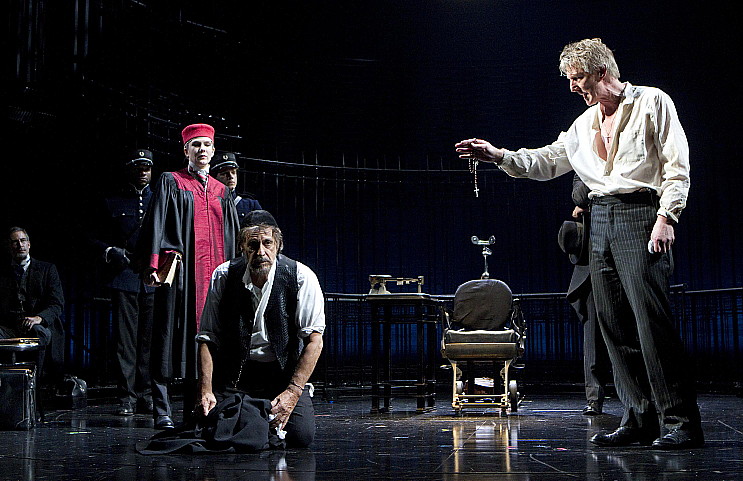The theater is schizophrenic, I mused after a recent matinee of Spiderman: Turn Off the Dark. Only a month before I’d seen Daniel Sullivan’s exemplary revival of The Merchant of Venice—it goes without saying that the shows were as different as night and day, but sometimes such dichotic experience makes us realize the range of what’s possible on a Broadway stage, or the valley that separates William Inge from Neil Simon, or Stephen Sondheim from Jerry Herman.
All humanity, all the time: for me no one can register the tenor of people, or the times, like Shakespeare. Merchant is a play I thought I knew well, but the ambiguities wrought by Sullivan and a cast lead by Al Pacino and Lily Rabe left a bitter taste of truths that linger for days. It’s the kind of DNA-shifting one craves, but rarely comes when you attend the theater. We get a glimpse of ourselves, and are reminded that the world is absurd; the idea of a tidy life is an illusion, and that between our desire and our need lies a vast gulf no human being ever truly masters.
Spiderman hasn’t opened officially, which means there’s a lingering controversy over the rights of critics to review it when there’s still work to be done. I think the questions are bigger: economics, a changing, uncultured audience, and our current LCD-saturated world drive the dialogue as much as the show’s actual merits.
Spiderman is not quite a musical. The best theater songs involve a transformation, some change that occurs between the beginning and the end of the melody. Bono and The Edge have written songs devoid of character revelation, or even development; I love the U2 sound—I came of age to their anthems of triumphant nihilism, but their moody machine-dreamed auralities have nothing to do with Peter Parker or Aunt May (the wasted Isabel Keating who’s merely collecting a paycheck, bless her heart) but all to do with being a name on the marquee, one that means box office gold.
Even so, a director like Michael Mayer might have made some dramatic sense of those songs by giving them a dimension of behavior not indicated in the lyrics, but Julie Taymor (with her collaborator Glen Berger, she is often not a writer of finesse, or even clarity) can’t be bothered, which means a state of generality reigns, further aggrieved by our inability to tell who’s singing what (something’s wrong when the lead vocalist of a number is in the shadows, perhaps told to go there so’s not to obscure some gargantuan descending set—turn off the dark, indeed). This is a musical where people are irrelevant; so many masks and puppets dominate the action that the actual characters are dwarfed, like Lilliputians sharing the stage with Times Square.
Magic occurs only when things slow down, but such moments are so sparse that I can only remember the first: the introduction of Arachne, Peter Parker’s nemesis or guardian angel, you pick. When a bevy of women advance and ascend to the accompaniment of sherbet swaths of gossamer that weaves itself panel by panel, we are enthralled, both by the hypnotic strangeness of the visual, and for its straightforward storytelling (derived from a Greek Myth—duh). This was signature Taymor—spectacle, yes, but with a soul. George Tsypin’s forced perspective sets locate the action expertly until the use of projections overload the production so much that the effect is of watching something that resembles less a stage show than a movie. After a while the shrouded atmosphere feels not so much exhilarating as stupefying; one wishes they’d taken a tip from the production design of Merchant—thanks to Mark Wendland’s sets and Kenneth Posner’s lighting design, that show’s subterranean blackness in the town scenes showed how darkness could illuminate, rather than obscure its subtextual underpinnings.
Another question loomed—who’s the intended audience for Spiderman? With its aerial stunts that propel actors over the heads of the audience, Spiderman aims for the demographic that are least likely to front the price of admission, but movie moguls covet: teen boys. From crying tykes mistakenly informed that this was a kiddie’s paradise, to bathroom-challenged folks prowling the aisles, to the non-stop rattling of food wrappers by a coterie of ticket buyers clearly raised by wolves, the matinee audience embodied the air of a high school basketball game on steroids. From what I observed, when they weren’t being their unruly selves, kids seemed mostly bored except for those airborne flights, a tangle of wires and bodies that depicted some sky battle or rescue.
In the month before its oft-delayed opening I wondered just what “improvements” lay ahead. Will Spiderman actually become more of a musical? Or will it jettison its book and score altogether, becoming Broadway’s answer to Cirque de Soleil? We shall see.
Getting it right: Above, Rabe, Pacino and Byron Jennings in The Merchant of Venice


So you’re saying it will tour well? They’ll love it in Montgomery OH?
Well, Mr J. it has to open first. Today in NYC they’ve reported that Julie Taymor has left the production–gotta find a new director, and a new opening date. We may be dead before it hits the road!